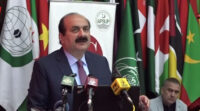The World Bank has revised its GDP growth projection for Pakistan for the fiscal year 2023-24 (FY24) to 1.7%, down from its previous estimate of 2%. This adjustment is highlighted in the latest report titled “Pakistan Development Update: Restoring Fiscal Sustainability,” released on Tuesday.
The report also outlines expectations of a recovery in FY25, with GDP growth projected at 2.4%. This recovery is contingent on robust implementation of the IMF Stand-By Arrangement (SBA), infusion of new external financing, and continued fiscal discipline.
However, the World Bank has issued a warning that Pakistan’s economy remains exposed to both domestic and external shocks unless significant fiscal adjustments and broad-based reforms are swiftly implemented. Economic growth is anticipated to continue lagging behind its potential in the medium term, despite some improvements in investment and exports.
In FY23, Pakistan’s economy experienced a sharp slowdown, with real GDP estimated to have contracted by 0.6%. This contraction can be attributed to a combination of factors, including domestic and external shocks such as the 2022 floods, government restrictions on imports and capital flows, domestic political uncertainties, rising global commodity prices, and tighter global financing conditions.
The report underscores that FY23 concluded with considerable pressure on domestic prices, fiscal and external accounts, and exchange rates, leading to a loss of investor confidence. High energy and food prices, reduced incomes, and agricultural and livestock losses due to the 2022 floods have collectively contributed to a notable increase in poverty. According to the report, the poverty headcount reached 39.4% in FY23, up from 34.2% in FY22.
Najy Benhassine, World Bank Country Director for Pakistan, emphasized the need for careful economic management and deep structural reforms to ensure macroeconomic stability and sustained growth. Aroub Farooq, Economist at the World Bank, further stressed the importance of comprehensive fiscal reforms encompassing tax policies, public expenditure rationalization, improved debt management, and enhanced coordination among government levels regarding fiscal matters.
The report additionally suggests reforms that involve reducing tax exemptions, broadening the tax base by imposing higher taxes on agriculture, property, and retailers, improving the quality of public expenditure by reducing distorting subsidies, enhancing the energy sector’s financial viability, and increasing private involvement in state-owned enterprises. It also recommends strengthening public debt management through better institutions and systems and developing a domestic debt market.
In contrast to the World Bank’s projections, the Asian Development Bank (ADB) had previously projected a modest recovery in Pakistan’s GDP growth to 1.9% in FY24, up from 0.3% in FY23, while noting that price pressures would remain elevated.
Key Takeaways:
- World Bank lowers Pakistan’s GDP growth projection for FY24 to 1.7%.
- Economic recovery to 2.4% in FY25 depends on IMF SBA, external financing, and fiscal restraint.
- Lack of fiscal adjustment and broad-based reforms could leave Pakistan vulnerable to shocks.
- FY23 saw a contraction of 0.6% in GDP due to various domestic and external factors.
- Poverty increased to 39.4% in FY23, up from 34.2% in FY22.
- Comprehensive fiscal reforms, tax policy changes, and debt management needed for stability.
- Asian Development Bank (ADB) projects a modest GDP growth recovery to 1.9% in FY24.






